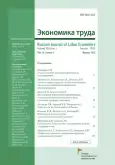Generation Z in the labor market: what should HR systems be prepared for?
- Authors: Belskaya Y.V.1,2, Borisova A.A.1,3, Khokholush M.S.4
-
Affiliations:
- Novosibirsk State Technical University
- The Siberian State University of Geosystems and Technologies (SSUGT)
- Siberian State University of Water Transport
- The Ural State University of Economics (USUE)
- Issue: Vol 10, No 1 (2023)
- Pages: 85-96
- Section: Articles
- URL: https://journals.eco-vector.com/2410-1613/article/view/607759
- DOI: https://doi.org/10.18334/et.10.1.117049
- ID: 607759
Cite item
Abstract
The problem of the complexity of ensuring the adjustment of influence managerial instruments on the company's personnel to the change of value demands for the work of representatives of a new generation of labor resources is posed. Typological characteristics of representatives of generation Z are highlighted. These characteristics influence and determine a set of dominant preferences for the choice of content, the nature of work, employment conditions and the place of professional potential realization. The substantiation of the characteristics of the empirical research base consisting of representatives of generation Z who have work experience by the end of their studies at the university is presented. The advantage of the sample of this study is the regional differentiation of labor resources. The dominant criteria of the request for the work of generation Z are highlighted. They are as follows: the relationship of work with the received professional training, the degree of self-realization and the possibility of organizing one's own work, the level of comfort in interaction with management and colleagues, the size of the organization and its location and the speed of career advancement. The less significant parameters of value orientations are as follows: the format of employment and organization of labor activity, the degree of influence on the amount of remuneration and the type of labor market. Taking into account the selected parameters of the labor request, recommendations to HR specialists of companies for the formation of a long-term personnel policy are offered.
About the authors
Yuliya Vladimirovna Belskaya
Novosibirsk State Technical University; The Siberian State University of Geosystems and Technologies (SSUGT)
Email: belskaya.73@mail.ru
Alena Aleksandrovna Borisova
Novosibirsk State Technical University; Siberian State University of Water Transport
Email: Bborisova2012@yandex.ru
Mariya Stanislavovna Khokholush
The Ural State University of Economics (USUE)
Email: hms@usue.ru
References
- Федеральный закон от 8 декабря 2020 г. N 407-ФЗ «О внесении изменений в Трудовой кодекс Российской Федерации в части регулирования дистанционной (удаленной) работы и временного перевода работника на дистанционную (удаленную) работу по инициативе работодателя в исключительных случаях»
- Ананьева Н.А., Рыбкина М.В. Влияние социально-демографических факторов на воспроизводство трудовых ресурсов в регионах // Управленческий учет. – 2022. – № 10-3. – c. 749-760. – doi: 10.25806/uu10-32022749-760.
- Борисова А.А. Конкурентоспособность и профильная занятость выпускников вузов: вопросы теории и методологии. / Монография. - Новосибирск: НГТУ, 2015. – 510 c.
- Борисова А.А., Белоногов А.А., Глушкова Ю.В. Трудоустройство выпускников вузов: смена приоритетов поиска профессиональной реализации // Экономика труда. – 2022. – № 3. – c. 675-688. – doi: 10.18334/et.9.3.114327.
- Борисова А.А., Рязанцева И.В. Организация образовательного процесса в период распространения пандемии: опыт адаптации и решения противоречий // Экономика труда. – 2021. – № 2. – c. 175-188. – doi: 10.18334/et.8.2.111778.
- Борисова А.А., Токарева А.С. Механизм регулирования трудовой миграции выпускников вузов. / Монография. - М.: Издательство Кнорус, 2020. – 132 c.
- Ведехин А.Ю. Трудоустройство молодых специалистов: актуальные проблемы и перспективы // Труд и социальные отношения. – 2022. – № 1. – c. 40-45. – doi: 10.20410/2073-7815-2022-33-1-40-45.
- Ковин Е.А., Лысенко О.В. Теория поколений в контексте социологии управления // Научный результат. Социология и управление. – 2019. – № 4. – c. 151-162. – doi: 10.18413/2408-9338-2019-5-4-0-13.
- Кочерга С.Ю. Трудоустройство молодежи: особенности, проблемы, пути решения // Вестник экспертного совета. – 2021. – № 4(27). – c. 52-57.
- Кязимов К.Г. Трудоустройство выпускников вузов и учреждений СПО в современных условиях // Ректор ВУЗа. – 2022. – № 6. – c. 30-35.
- Мешкова Е.С. Теория поколений: особенности в подходах к адаптации молодых специалистов // Общество. – 2019. – № 4(15). – c. 31-35.
- Литвинова Г.А. Трудоустройство молодых специалистов как объект управления // Общество: социология, психология, педагогика. – 2022. – № 10(102). – c. 77-81. – doi: 10.24158/spp.2022.10.11.
- Нагапетян К.В., Озерникова Т.Г. Удаленная работа в условиях пандемии: проблемы и возможности для бизнеса и персонала // Управление персоналом и интеллектуальными ресурсами в России. – 2021. – № 1. – c. 70-79. – doi: 10.12737/2305-7807-2021-10-1-70-79.
- Семионова Е.А. Трудоустройство молодежи: проблемы и тренды // Экономическое развитие России. – 2022. – № 10. – c. 64-68.
- Халиков А.Л., Касьянова Д.Р. Интеллектуальный потенциал как фактор, влияющий на трудоустройство выпускника // Экономические науки. – 2022. – № 210. – c. 201-205. – doi: 10.14451/1.210.201.
- Abisheva A.Y., Yeralina E.M. Soft skills of bachelor degree students : analysis of sources by gender for employment // Central Asian Economic Review. – 2022. – № 1(142). – p. 60-72. – doi: 10.52821/2789-4401-2022-1-60-72.
Supplementary files








